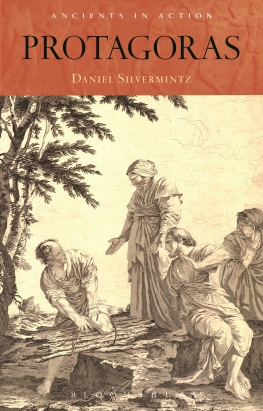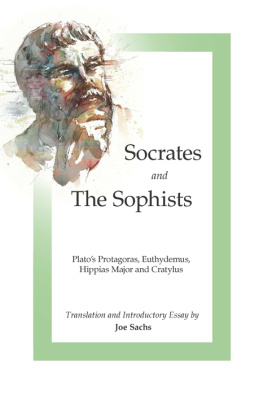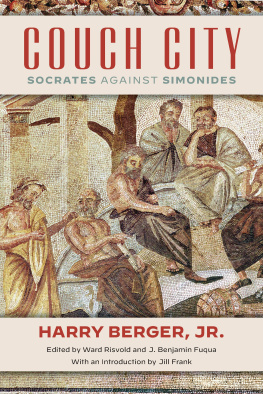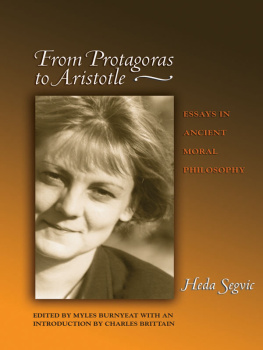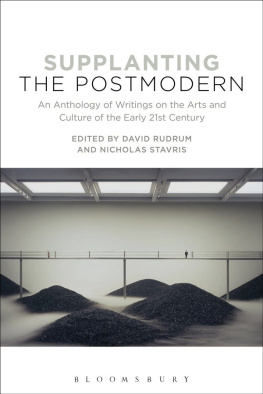Silvermintz - Protagoras: the ancient roots of postmodern thought
Here you can read online Silvermintz - Protagoras: the ancient roots of postmodern thought full text of the book (entire story) in english for free. Download pdf and epub, get meaning, cover and reviews about this ebook. year: 2016, publisher: Bloomsbury UK, genre: Science. Description of the work, (preface) as well as reviews are available. Best literature library LitArk.com created for fans of good reading and offers a wide selection of genres:
Romance novel
Science fiction
Adventure
Detective
Science
History
Home and family
Prose
Art
Politics
Computer
Non-fiction
Religion
Business
Children
Humor
Choose a favorite category and find really read worthwhile books. Enjoy immersion in the world of imagination, feel the emotions of the characters or learn something new for yourself, make an fascinating discovery.
- Book:Protagoras: the ancient roots of postmodern thought
- Author:
- Publisher:Bloomsbury UK
- Genre:
- Year:2016
- Rating:4 / 5
- Favourites:Add to favourites
- Your mark:
- 80
- 1
- 2
- 3
- 4
- 5
Protagoras: the ancient roots of postmodern thought: summary, description and annotation
We offer to read an annotation, description, summary or preface (depends on what the author of the book "Protagoras: the ancient roots of postmodern thought" wrote himself). If you haven't found the necessary information about the book — write in the comments, we will try to find it.
Silvermintz: author's other books
Who wrote Protagoras: the ancient roots of postmodern thought? Find out the surname, the name of the author of the book and a list of all author's works by series.
Protagoras: the ancient roots of postmodern thought — read online for free the complete book (whole text) full work
Below is the text of the book, divided by pages. System saving the place of the last page read, allows you to conveniently read the book "Protagoras: the ancient roots of postmodern thought" online for free, without having to search again every time where you left off. Put a bookmark, and you can go to the page where you finished reading at any time.
Font size:
Interval:
Bookmark:

Protagoras
ANCIENTS IN ACTION
Boudicca
Marguerite Johnson
Catiline
Barbara Levick
Catullus
Amanda Hurley
Cleopatra
Susan Walker and Sally-Ann Ashton
Hadrian
James Morwood
Hannibal
Robert Garland
Horace
Philip D. Hills
Lucretius
John Godwin
Martial
Peter Howell
Ovid: Love Songs
Genevieve Lively
Ovid: Myth and Metamorphosis
Sarah Annes Brown
Pindar
Anne Pippin Burnett
Sappho
Marguerite Johnson
Spartacus
Theresa Urbainszyk
Tacitus
Rhiannon Ash
Protagoras
Daniel Silvermintz
Bloomsbury Academic
An imprint of Bloomsbury Publishing Plc

Contents
Most likely, though, Protagoras, being older, is wiser than we, and if, for example, he should emerge from the ground, here at our feet, if only as far as the neck, he would prove abundantly that I was making a fool of myself by my talk, in all probability, and you by agreeing with me; then he would sink down and be off at a run. (Socrates in Platos Theaetetus 171cd)
This book is a study of Protagoras of Abdera (c. 490420 bc) , the founder of the sophistic movement and one of the most controversial thinkers in the history of philosophy. Despite having acquired a cult-like following of devotees, many philosophers of the period dismissed Protagoras as a charlatan who was more concerned with obtaining riches than wisdom. This judgment of his character has surrounded Protagoras for much of the last two-and-a-half thousand years. To cite just one example, the following is a second-century ad assessment of the infamous thinker:
This Protagoras was not a true philosopher, but the cleverest of sophists; for in consideration of the payment of a huge annual fee, he used to promise his pupils that he would teach them by what verbal dexterity the weaker cause could be made the stronger. (Gellius, Attic Nights 5.4.1)
In spite of the long-held prejudice against Protagoras, his relativistic first principles pose a serious challenge to the tradition of Western metaphysics. After suffering many years of vilification, Protagoras has recently been rediscovered by postmodern thinkers for having provided an alternative ground for philosophic speculation. In the wake of this resurgent interest in Protagoras, there is no better time to engage in a serious investigation of his life and thought.
Although many of Protagoras ideas do not seem particularly shocking to someone in the twenty-first century, they were absolutely groundbreaking in his own day. This begins with his agnosticism regarding the traditional Greek gods. Having concluded that it would be too difficult either to prove or disprove the existence of the gods, Protagoras summarily dismisses them as irrelevant and repositions human beings in their place as the sole arbiters of truth. In his most well-known aphorism, Protagoras declares, Of all things the measure is Man, of the things that are, that they are, and of the things that are not, that they are not (DK 80B1). This seemingly innocent attempt to dignify the human experience constitutes nothing less than a complete revaluation of all values. Rather than appealing to a transcendent realm of absolute truth, Protagoras affirms that there are as many truths as people in the world. This radical understanding of epistemology led him to an equally radical political theory. Protagoras is credited as the first thinker to provide a philosophic defense of democracythe only regime that validates the thoughts and opinions of all of its citizens. Recognizing the value of persuasion within this contentious political climate, he taught the art of rhetoric and advocated its use as the best means for advancing ones interest over competing parties. Although an early proponent of public education for the poor, Protagoras won fame and fortune providing Greeces wealthy elite with the forensic skills to ascend the political ranks as powerful statesmen.
Protagoras was a prolific author publishing no less than thirteen works concerning theology, politics, ethics, and rhetoric. Unfortunately, only the titles of these works survive, leaving us to piece together his contributions from a handful of anecdotes about his life and from a fairly short collection of quotations found in other authors. The most significant of these sources are Platos Protagoras and Theaetetus . In the dialogue named for him, Protagoras appears as a character and presents his ideas regarding ethics and politics in a passage known as the Great Speech (Plato, Protagoras 320c328d). Many scholars believe that Plato has faithfully preserved Protagoras central ideas in this passage. In light of this scholarly consensus, my analysis will largely be based on an interpretation of this section of Platos dialogue.
Although Socrates directly interrogates Protagoras following the Great Speech, he is afforded much greater freedom in several other Platonic dialogues to scrutinize the sophists ideas without him being there to defend himself. During one of these investigations, Socrates reveals that Protagoras had, in addition to his public discourse promoting morality, a less ethical secret doctrine that he shared privately with selected students. If Socrates provocative claim is true, then we risk completely misunderstanding Protagoras if we do not go beyond the surface of what he says. Consequently, the book will conclude with a more speculative analysis of the secret doctrine concealed within the Great Speech.
, From Humble Beginnings to Celebrated Teacher, provides an intellectual biography of Protagoras by drawing on the surviving anecdotes about his life. This includes a detailed discussion of his education under the philosopher Democritus. In particular, the ethical and epistemological implications of Democritus physics are considered in order to show how the materialist approach of the pre-Socratic natural scientists laid the groundwork for Protagoras radical views on these subjects. This overview is followed by a discussion of Protagoras emergence as a professional educator with special focus on his introduction of the practice of charging for instruction.
injustice of Protagoras seemingly noble defense of equal rights for all citizens.
The concluding chapter, Protagoras Secret Teaching, begins by placing Protagoras in the history of esoteric thinkers. After establishing his use of esotericism in the Great Speech, the chapter proceeds with an exegesis of his public discourse promoting morality. It is then shown how various anomalies within this account expose a less ethical secret doctrine. Despite Protagoras eloquent and reasoned defense of traditional morality, the secret doctrine affirms that the best means for maximizing ones self-interest is to rule the city as a powerful statesman who stands beyond the law.
In a comical scene in Platos Theaetetus (171cd), the deceased Protagoras wakes from the dead and pops his head above ground just far enough to chastise Socrates for what he believes is a mischaracterization of his ideas. It is impossible to offer a completely objective interpretation of Protagoras thought, and this work is no exception. Hopefully, Protagoras does not take too much offense from the grave at the critical assessment of his ideas presented in this book. If nothing else, I offer the following as one interpretation of his thought with the understanding that there are always many sides to an argument.
Nothing helps clarify a difficult thinkers ideas as much as teaching them to others. For this, I thank my students at the University of Houston-Clear Lake, especially Tammy Childress, Christopher Rhodes, Rebecca Franco-Garcia, Joshua Richards, Daniel Stuart, Ashleigh Godfrey, and Dru Watkins. Additionally, I thank friends from Lynbrook, Amherst, Annapolis, Irvine, Dallas, and Houston with whom I have discussed philosophy over the last 30 years. Several scholars have read parts of the manuscript, and I am grateful to Donald Kagan, Sarah Costello, and Laurence Lampert. I also thank my university for granting me a faculty development leave in order to work on this project. For general encouragement, I thank my mother-in-law, Marj Hales, and my parents, Carole and Joseph Silvermintz. Finally, I owe my greatest debt of gratitude to my wife and esteemed colleague, Barbara Hales.
Font size:
Interval:
Bookmark:
Similar books «Protagoras: the ancient roots of postmodern thought»
Look at similar books to Protagoras: the ancient roots of postmodern thought. We have selected literature similar in name and meaning in the hope of providing readers with more options to find new, interesting, not yet read works.
Discussion, reviews of the book Protagoras: the ancient roots of postmodern thought and just readers' own opinions. Leave your comments, write what you think about the work, its meaning or the main characters. Specify what exactly you liked and what you didn't like, and why you think so.

